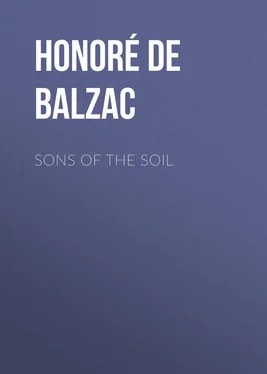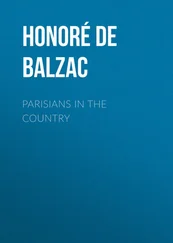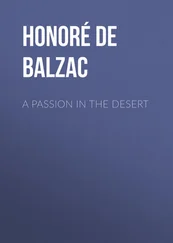Honoré Balzac - Sons of the Soil
Здесь есть возможность читать онлайн «Honoré Balzac - Sons of the Soil» — ознакомительный отрывок электронной книги совершенно бесплатно, а после прочтения отрывка купить полную версию. В некоторых случаях можно слушать аудио, скачать через торрент в формате fb2 и присутствует краткое содержание. Жанр: literature_19, foreign_antique, foreign_prose, на английском языке. Описание произведения, (предисловие) а так же отзывы посетителей доступны на портале библиотеки ЛибКат.
- Название:Sons of the Soil
- Автор:
- Жанр:
- Год:неизвестен
- ISBN:нет данных
- Рейтинг книги:5 / 5. Голосов: 1
-
Избранное:Добавить в избранное
- Отзывы:
-
Ваша оценка:
- 100
- 1
- 2
- 3
- 4
- 5
Sons of the Soil: краткое содержание, описание и аннотация
Предлагаем к чтению аннотацию, описание, краткое содержание или предисловие (зависит от того, что написал сам автор книги «Sons of the Soil»). Если вы не нашли необходимую информацию о книге — напишите в комментариях, мы постараемся отыскать её.
Sons of the Soil — читать онлайн ознакомительный отрывок
Ниже представлен текст книги, разбитый по страницам. Система сохранения места последней прочитанной страницы, позволяет с удобством читать онлайн бесплатно книгу «Sons of the Soil», без необходимости каждый раз заново искать на чём Вы остановились. Поставьте закладку, и сможете в любой момент перейти на страницу, на которой закончили чтение.
Интервал:
Закладка:
Fourchon, reassured by the harshness of this remark, dropped his head on his breast as though vanquished and convinced.
“Look at that pretty snare,” resumed Tonsard, coming up to his father-in-law and laying the trap upon his knee. “Some of these days they’ll want game at Les Aigues, and we shall sell them their own, or there will be no good God for the poor folks.”
“A fine piece of work,” said the old man, examining the mischievous machine.
“It is very well to pick up the sous now, papa,” said Mam Tonsard, “but you know we are to have our share in the cake of Les Aigues.”
“Oh, what chatterers women are!” cried Tonsard. “If I am hanged it won’t be for a shot from my gun, but for the gabble of your tongue.”
“And do you really suppose that Les Aigues will be cut up and sold in lots for your pitiful benefit?” asked Fourchon. “Pshaw! haven’t you discovered in the last thirty years that old Rigou has been sucking the marrow out of your bones that the middle-class folks are worse than the lords? Mark my words, when that affair happens, my children, the Soudrys, the Gaubertins, the Rigous, will make you kick your heels in the air. ‘I’ve the good tobacco, it never shall be thine,’ that’s the national air of the rich man, hey? The peasant will always be the peasant. Don’t you see (but you never did understand anything of politics!) that government puts such heavy taxes on wine only to hinder our profits and keep us poor? The middle classes and the government, they are all one. What would become of them if everybody was rich? Could they till their fields? Would they gather the harvest? No, they want the poor! I was rich for ten years and I know what I thought of paupers.”
“Must hunt with them, though,” replied Tonsard, “because they mean to cut up the great estates; after that’s done, we can turn against them. If I’d been Courtecuisse, whom that scoundrel Rigou is ruining, I’d have long ago paid his bill with other balls than the poor fellow gives him.”
“Right enough, too,” replied Fourchon. “As Pere Niseron says (and he stayed republican long after everybody else), ‘The people are tough; they don’t die; they have time before them.’”
Fourchon fell into a sort of reverie; Tonsard profited by his inattention to take back the trap, and as he took it up he cut a slip below the coin in his father-in-law’s pocket at the moment when the old man raised his glass to his lips; then he set his foot on the five-franc piece as it dropped on the earthen floor just where it was always kept damp by the heel-taps which the customers flung from their glasses. Though quickly and lightly done, the old man might, perhaps, have felt the theft, if Vermichel had not happened to appear at that moment.
“Tonsard, do you know where you father is?” called that functionary from the foot of the steps.
Vermichel’s shout, the theft of the money, and the emptying of old Fourchon’s glass, were simultaneous.
“Present, captain!” cried Fourchon, holding out a hand to Vermichel to help him up the steps.
Of all Burgundian figures, Vermichel would have seemed to you the most Burgundian. The practitioner was not red, he was scarlet. His face, like certain tropical portions of the globe, was fissured, here and there, with small extinct volcanoes, defined by flat and greenish patches which Fourchon called, not unpoetically, the “flowers of wine.” This fiery face, the features of which were swelled out of shape by continual drunkenness, looked cyclopic; for it was lighted on the right side by a gleaming eye, and darkened on the other by a yellow patch over the left orb. Red hair, always tousled, and a beard like that of Judas, made Vermichel as formidable in appearance as he was meek in reality. His prominent nose looked like an interrogation-mark, to which the wide-slit mouth seemed to be always answering, even when it did not open. Vermichel, a short man, wore hob-nail shoes, bottle-green velveteen trousers, an old waistcoat patched with diverse stuffs which seemed to have been originally made of a counterpane, a jacket of coarse blue cloth and a gray hat with a broad brim. All this luxury, required by the town of Soulanges where Vermichel fulfilled the combined functions of porter at the town-hall, drummer, jailer, musician, and practitioner, was taken care of by Madame Vermichel, an alarming antagonist of Rabelaisian philosophy. This virago with moustachios, about one yard in width and one hundred and twenty kilograms in weight (but very active), ruled Vermichel with a rod of iron. Thrashed by her when drunk, he allowed her to thrash him still when sober; which caused Pere Fourchon to say, with a sniff at Vermichel’s clothes, “It is the livery of a slave.”
“Talk of the sun and you’ll see its beams,” cried Fourchon, repeating a well-worn allusion to the rutilant face of Vermichel, which really did resemble those copper suns painted on tavern signs in the provinces. “Has Mam Vermichel spied too much dust on your back, that you’re running away from your four-fifths, – for I can’t call her your better half, that woman! What brings you here at this hour, drum-major?”
“Politics, always politics,” replied Vermichel, who seemed accustomed to such pleasantries.
“Ah! business is bad in Blangy, and there’ll be notes to protest, and writs to issue,” remarked Pere Fourchon, filling a glass for his friend.
“That APE of ours is right behind me,” replied Vermichel, with a backward gesture.
In workmen’s slang “ape” meant master. The word belonged to the dictionary of the worthy pair.
“What’s Monsieur Brunet coming bothering about here?” asked Tonsard.
“Hey, by the powers, you folks!” said Vermichel, “you’ve brought him in for the last three years more than you are worth. Ha! that master at Les Aigues, he has his eye upon you; he’ll punch you in the ribs; he’s after you, the Shopman! Brunet says, if there were three such landlords in the valley his fortune would be made.”
“What new harm are they going to do to the poor?” asked Marie.
“A pretty wise thing for themselves,” replied Vermichel. “Faith! you’ll have to give in, in the end. How can you help it? They’ve got the power. For the last two years haven’t they had three foresters and a horse-patrol, all as active as ants, and a field-keeper who is a terror? Besides, the gendarmerie is ready to do their dirty work at any time. They’ll crush you – ”
“Bah!” said Tonsard, “we are too flat. That which can’t be crushed isn’t the trees, it’s ground.”
“Don’t you trust to that,” said Fourchon to his son-in-law; “you own property.”
“Those rich folks must love you,” continued Vermichel, “for they think of nothing else from morning till night! They are saying to themselves now like this: ‘Their cattle eat up our pastures; we’ll seize their cattle; they can’t eat grass themselves.’ You’ve all been condemned, the warrants are out, and they have told our ape to take your cows. We are to begin this morning at Conches by seizing old mother Bonnebault’s cow and Godin’s cow and Mitant’s cow.”
The moment the name of Bonnebault was mentioned, Marie, who was in love with the old woman’s grandson, sprang into the vineyard with a nod to her father and mother. She slipped like an eel through a break in the hedge, and was off on the way to Conches with the speed of a hunted hare.
“They’ll do so much,” remarked Tonsard, tranquilly, “that they’ll get their bones broken; and that will be a pity, for their mothers can’t make them any new ones.”
“Well, perhaps so,” said old Fourchon, “but see here, Vermichel, I can’t go with you for an hour or more, for I have important business at the chateau.”
Читать дальшеИнтервал:
Закладка:
Похожие книги на «Sons of the Soil»
Представляем Вашему вниманию похожие книги на «Sons of the Soil» списком для выбора. Мы отобрали схожую по названию и смыслу литературу в надежде предоставить читателям больше вариантов отыскать новые, интересные, ещё непрочитанные произведения.
Обсуждение, отзывы о книге «Sons of the Soil» и просто собственные мнения читателей. Оставьте ваши комментарии, напишите, что Вы думаете о произведении, его смысле или главных героях. Укажите что конкретно понравилось, а что нет, и почему Вы так считаете.












